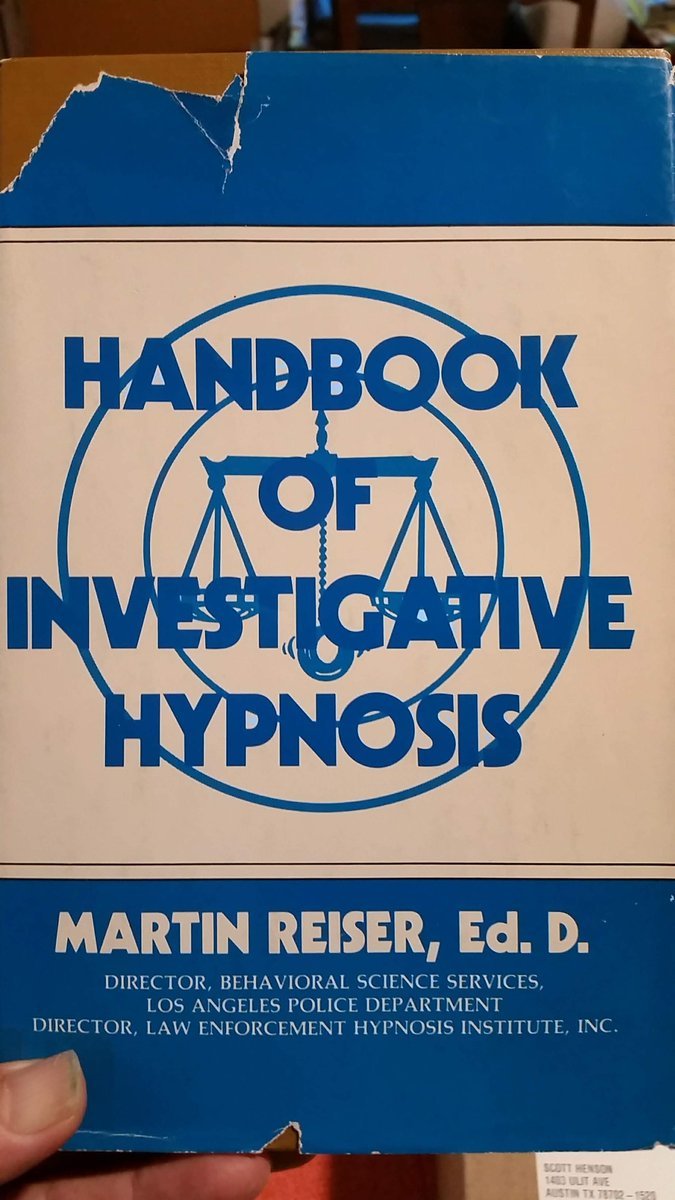There was a time not long ago when this practice was more widespread; today, it's largely a source of derision and few if any agencies practice it any longer. It was the junkiest of junk sciences I've ever encountered, and Grits has seen some.*
Still, discredited though it was, Texas officials weren't about to ban this junk science technique from the courtroom. The Forensic Science Commission determined they had no jurisdiction to consider hypnosis. Legislation was filed in the Texas Senate in 2019 to banish the practice from courtrooms, but, the committee chair wouldn't give it a hearing. Then the technique was challenged under Texas' junk-science writ, which should have been the end of it. But it was a death penalty case and the Government Always Wins faction on the Court of Criminal Appeals flexed their muscle, declining to apply the writ without giving an explanation.
After the US Supreme Court declined to take up the issue - unsurprising, since the junk-science writ is a state law with no explicit federal skin in the game - efforts to banish forensic hypnosis appeared to be stymied.
The decision by DPS to end the practice came like a bolt from the blue; most folks thought they wouldn't end it unless they were forced to do so. Apparently, someone internally simply decided the technique could no longer be justified. I'd love to know the backstory (off the record tips welcome!). The hypnosis program apparently ended in January but the agency never announced it.
Your correspondent takes some pride at raising the profile of this issue. In the Texas political realm, the topic was first raised in a 2017 Reasonably Suspicious podcast segment brought forward by my co-host Amanda Marzullo on the Charles Don Flores case, the one that SCOTUS later declined to review.
This piqued my interest and Grits followed up with a research primer on the subject that exposed the charlatanism underlying the practice. I purchased a copy of the book used to train forensic hypnotists under TCOLE's training curriculum. It included favorable references to occult practices like "automatic writing," portrayed memory as the equivalent of a videotape that hypnotists could simply play back, and encouraged "age regression" to recall long-ago events. Mandy and I began to follow the Flores case on the podcast.I pitched the story to Lauren McGaughy at the Dallas News who ably picked up the ball, first publishing a preliminary assessment in 2018. This raised the profile of the topic in state government - helping me convince state Sen. Juan "Chuy" Hinojosa to file his roundly ignored legislation in 2019. Meanwhile, the courts were mimicking the iconic monkeys who see, hear, and speak no evil.
Then, last year, the Dallas News published a major two-part feature McGaughy co-reported with Dave Boucher called "The Memory Room." They spent months pursuing open records requests and dove deep into DPS practices and TCOLE records, revealing details no one outside those agencies knew. It was hard to imagine how responsible decision makers, after reading this damning assessment, could continue to let cops hypnotize witnesses.
Still, Grits wasn't sanguine the Legislature would even take up the topic; the same chairman who wouldn't give the bill a hearing still runs the committee, and the Court of Criminal Appeals' failure to take up the cause seemed to have shunted the issue to the back burner for state government.
DPS ending its hypnosis program changes the landscape, surprising all observers and opening up new opportunities. If neither they nor HCSO any longer use hypnosis, Texas can now shut down the practice entirely. Reported McGaughy, "Texas remains the only state known to have an active certification program for law enforcement officers to learn hypnosis and is also the home to likely the nation’s only extant police organization for investigative hypnotists."
There's no need for that certification program now and the Legislature should eliminate it as part of the TCOLE Sunset bill. This is EXACTLY the sort of thing the Sunset process was created to do: Extinguish outdated, anachronistic, and unnecessary programs.
Here's the rub: Even if the Legislature ends the certification, there are still numerous cases - nobody knows how many, but including Mr. Flores' death-penalty case - marching forward through the system like zombies based on past convictions secured using this practice, and more people locked up in TDCJ or on parole whose convictions were tainted by the same junk science.
I'm not a lawyer but Grits doesn't know if there's any way to help those folks if the CCA won't apply the junk-science writ. I suppose the Forensic Science Commission's jurisdiction could be expanded to evaluate this now-mostly-dead forensic method so that courts would have a basis to revisit it. But that's an open-ended, speculative process that could take years. It seems like waste of time when the CCA could already have done the right thing, and still could.
Grits' takeaways: The Texas Legislature should both abolish the hypnosis-certification program (TCOLE's Sunset review is remarkably well-timed for this purpose) and expand FSC jurisdiction to evaluate forensic hypnosis. The Texas Rangers may have stopped using this particular junk-science technique, but the topic won't finally go away until the courts do.
* I was Policy Director at the Innocence Project of Texas for 8 years and conceived of and negotiated with prosecutors to pass Texas' junk-science writ. The only bogus "science" I've seen that's arguably as junky as forensic hypnosis was dog-scent lineups, and the CCA got rid of that abomination.


Which committee chair was it, Grits? Name names!
ReplyDeleteBackground reading for the nerds…
ReplyDelete2015 Steven Lynn, Forensic Hypnosis
https://anonymousfiles.io/1xbkKboA/